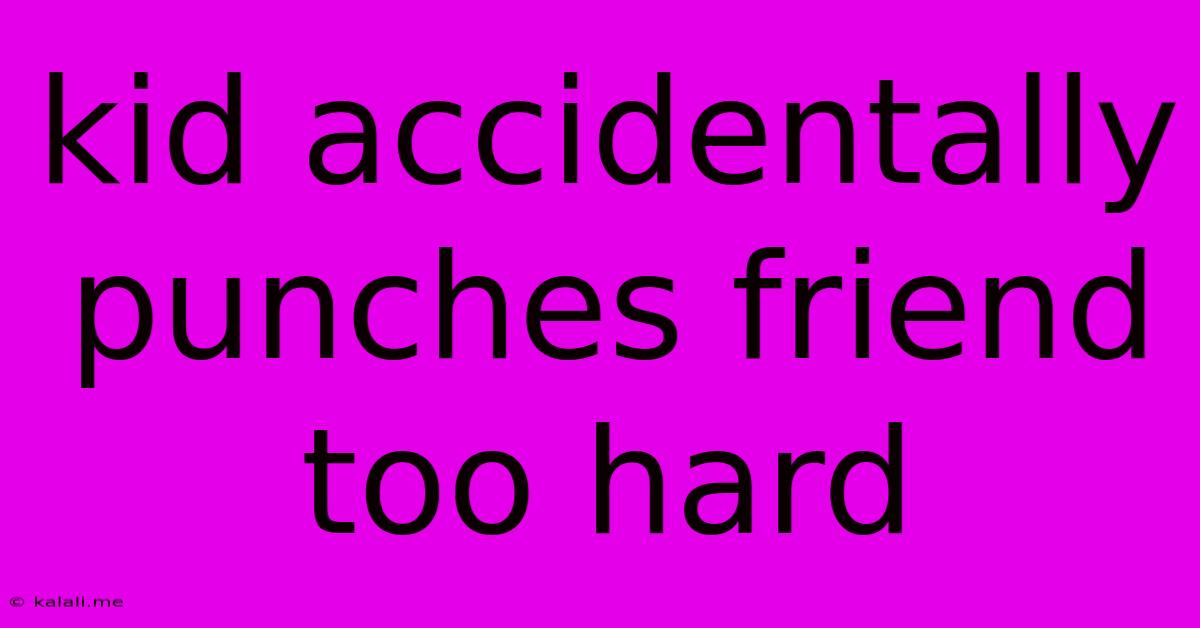Kid Accidentally Punches Friend Too Hard
Kalali
Jun 05, 2025 · 3 min read

Table of Contents
When Playtime Gets Rough: What to Do When a Child Accidentally Hurts a Friend
Accidents happen, especially when kids are playing. While most bumps and bruises are minor, sometimes a playful shove or swing can result in a more serious injury, like when a child accidentally punches a friend too hard. This can be a distressing situation for both the child who inflicted the injury and the one who was hurt, as well as their parents. This article will guide you through understanding the situation, addressing immediate concerns, and preventing future incidents.
Understanding the Incident: It's Not Always About Aggression
It's crucial to remember that young children aren't always capable of controlling their strength or understanding the consequences of their actions. A hard punch might not be an act of aggression, but rather a poorly executed playful gesture, an overzealous reaction, or simply a lack of coordination. Understanding the context is vital. Was it during rough-and-tumble play? Did the child misjudge the distance or force? Asking these questions helps determine the underlying cause and tailor the response accordingly.
Immediate Actions After an Accidental Injury
-
Assess the Injury: Check the injured child for any signs of serious injury such as significant swelling, bleeding, difficulty breathing, or loss of consciousness. If there are any concerns, seek immediate medical attention.
-
Comfort the Injured Child: Offer comfort and reassurance to the injured child. A hug, a gentle touch, and kind words can go a long way in soothing their pain and fear.
-
Comfort the Child Who Inflicted the Injury: The child who accidentally hurt their friend may also be feeling scared, guilty, or upset. Acknowledge their feelings and reassure them that accidents happen. Avoid assigning blame or punishment immediately; focus on understanding and empathy.
-
Inform Parents: Contact the parents of both children to inform them about the incident and the steps taken. Open communication is essential for resolving the situation and ensuring proper care for the injured child.
-
First Aid: If appropriate, administer first aid such as applying ice to reduce swelling or cleaning a minor wound.
Teaching Children About Appropriate Play and Force
Accidental injuries are opportunities for learning and growth. After the immediate aftermath, focus on teaching your child and their friend about safe play and the importance of controlling their actions.
Strategies for Preventing Future Incidents
-
Supervise Playtime: Close supervision, particularly during rough-and-tumble play, can help prevent accidents.
-
Teach Impulse Control: Help children develop impulse control by practicing mindfulness techniques, such as taking deep breaths before engaging in physical activity.
-
Establish Clear Rules: Set clear rules about appropriate behavior during playtime, emphasizing respect for others and the importance of gentle touch.
-
Role-Playing and Practice: Practice different scenarios, demonstrating how to play gently and safely.
-
Emotional Regulation: Teach children how to identify and manage their emotions, as strong emotions can sometimes lead to uncontrolled physical actions.
-
Appropriate Play Activities: Encourage engaging in age-appropriate activities and providing alternatives to roughhousing when needed.
Moving Forward: Fostering Empathy and Understanding
After addressing the immediate concerns, it’s important to help both children process their emotions and learn from the experience. Encourage empathy and understanding by having them talk about their feelings and how to avoid similar situations in the future. A simple apology from the child who caused the injury, coupled with kind words and gestures of support from the injured child, can greatly contribute to healing and reconciliation. Remember, accidents happen, but learning from them is key to fostering safe and positive relationships.
Latest Posts
Latest Posts
-
How Long Can You Leave A Crossbow Cocked
Jun 07, 2025
-
Down Sleeping Bag Smells Like Wet Dog
Jun 07, 2025
-
How To Move A Chest In Stardew Valley
Jun 07, 2025
-
Is Oxiclean Laundry Sanitizer The Same Thing As Oxiclean Bleach
Jun 07, 2025
-
How To Spell Lights Name From Death Note In Japanese
Jun 07, 2025
Related Post
Thank you for visiting our website which covers about Kid Accidentally Punches Friend Too Hard . We hope the information provided has been useful to you. Feel free to contact us if you have any questions or need further assistance. See you next time and don't miss to bookmark.